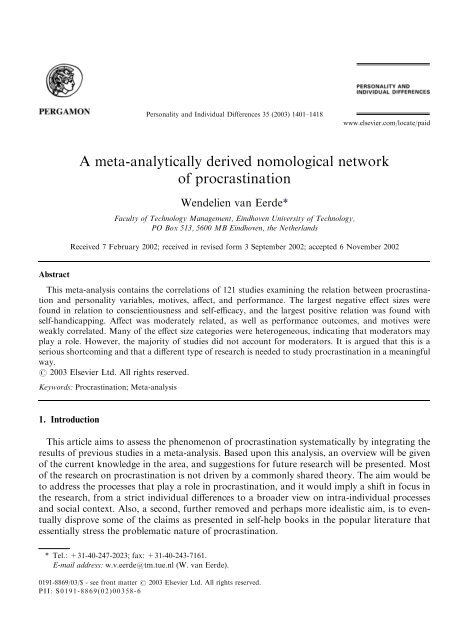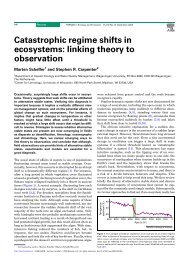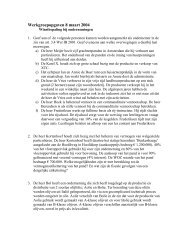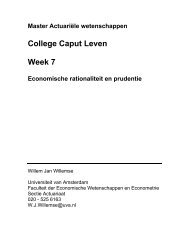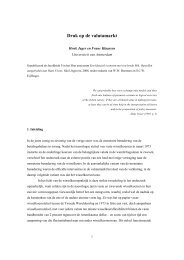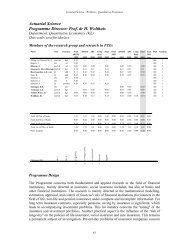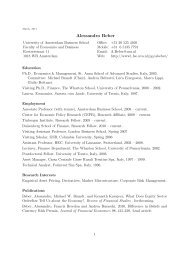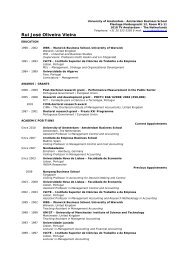A meta-analytically derived nomological network of procrastination
A meta-analytically derived nomological network of procrastination
A meta-analytically derived nomological network of procrastination
Create successful ePaper yourself
Turn your PDF publications into a flip-book with our unique Google optimized e-Paper software.
A <strong>meta</strong>-<strong>analytically</strong> <strong>derived</strong> <strong>nomological</strong> <strong>network</strong><br />
<strong>of</strong> <strong>procrastination</strong><br />
Wendelien van Eerde*<br />
Faculty <strong>of</strong> Technology Management, Eindhoven University <strong>of</strong> Technology,<br />
PO Box 513, 5600 MB Eindhoven, the Netherlands<br />
Received 7 February 2002;received in revised form 3 September 2002;accepted 6 November 2002<br />
Abstract<br />
This <strong>meta</strong>-analysis contains the correlations <strong>of</strong> 121 studies examining the relation between <strong>procrastination</strong><br />
and personality variables, motives, affect, and performance. The largest negative effect sizes were<br />
found in relation to conscientiousness and self-efficacy, and the largest positive relation was found with<br />
self-handicapping. Affect was moderately related, as well as performance outcomes, and motives were<br />
weakly correlated. Many <strong>of</strong> the effect size categories were heterogeneous, indicating that moderators may<br />
play a role. However, the majority <strong>of</strong> studies did not account for moderators. It is argued that this is a<br />
serious shortcoming and that a different type <strong>of</strong> research is needed to study <strong>procrastination</strong> in a meaningful<br />
way.<br />
# 2003 Elsevier Ltd. All rights reserved.<br />
Keywords: Procrastination;Meta-analysis<br />
1. Introduction<br />
This article aims to assess the phenomenon <strong>of</strong> <strong>procrastination</strong> systematically by integrating the<br />
results <strong>of</strong> previous studies in a <strong>meta</strong>-analysis. Based upon this analysis, an overview will be given<br />
<strong>of</strong> the current knowledge in the area, and suggestions for future research will be presented. Most<br />
<strong>of</strong> the research on <strong>procrastination</strong> is not driven by a commonly shared theory. The aim would be<br />
to address the processes that play a role in <strong>procrastination</strong>, and it would imply a shift in focus in<br />
the research, from a strict individual differences to a broader view on intra-individual processes<br />
and social context. Also, a second, further removed and perhaps more idealistic aim, is to eventually<br />
disprove some <strong>of</strong> the claims as presented in self-help books in the popular literature that<br />
essentially stress the problematic nature <strong>of</strong> <strong>procrastination</strong>.<br />
* Tel.: +31-40-247-2023;fax: +31-40-243-7161.<br />
E-mail address: w.v.eerde@tm.tue.nl (W. van Eerde).<br />
Personality and Individual Differences 35 (2003) 1401–1418<br />
0191-8869/03/$ - see front matter # 2003 Elsevier Ltd. All rights reserved.<br />
PII: S0191-8869(02)00358-6<br />
www.elsevier.com/locate/paid
1402 W. van Eerde / Personality and Individual Differences 35 (2003) 1401–1418<br />
1.1. Procrastination as a trait<br />
Procrastination has typically been defined as a trait or behavioural disposition to postpone or<br />
delay performing a task or making decisions (Milgram, Mey-Tal, & Levison, 1998). Defining<br />
<strong>procrastination</strong> is problematic in the sense that it is an intra-individual process that is regulated<br />
by internal norms <strong>of</strong> delay. To others, delay may or may not appear to be <strong>procrastination</strong> (cf. Milgram,<br />
Srol<strong>of</strong>f, & Rosenbaum, 1988), depending on their own norms and attributions. Delay can be<br />
purposely planned, and it can be a wise strategy. However, <strong>procrastination</strong> can be distinguished from<br />
planning because the delay is not purposely planned, but rather postponing the implementation <strong>of</strong><br />
what was planned. Everyone may procrastinate at some occasion, but the trait definition appears to<br />
indicate that the individual delays actions or decisions whether it is appropriate to a particular situation<br />
or not. Why would an individual have this tendency? It appears to be the inability to delay<br />
gratification, also called the lack <strong>of</strong> impulse control. Impulse control is the ability to give up shortterm<br />
outcomes—usually seen as more pleasant—for long-term outcomes. Mischel and colleagues<br />
(e.g. Mischel, Shoda, & Peake, 1988) showed the positive effects <strong>of</strong> impulse control over many years<br />
(for an example relating self-control to <strong>procrastination</strong> see also Ferrari & Emmons, 1995).<br />
In an historical overview <strong>of</strong> <strong>procrastination</strong> (Ferrari, Johnson, & McCown, 1995) it was noted<br />
that the Latin verb procrastinare, meaning ‘‘putting forward until tomorrow’’, did not have<br />
negative connotation until the mid-18th century, at the beginning <strong>of</strong> the Industrial Revolution.<br />
To this day, <strong>procrastination</strong> has moral connotations (Sabini & Silver, 1982);it implies not living<br />
up to others’ or one’s own obligations, which can lead to feelings <strong>of</strong> guilt. In general, it is seen as<br />
a dysfunctional habit, with psychological consequences such as experienced guilt or negative<br />
affective well-being, and a decrease in performance outcomes, and social consequences such as an<br />
image <strong>of</strong> undependability. This moral connotation may be part <strong>of</strong>, or may in fact be, the problem<br />
experienced. In other cultures, not as influenced by a protestant work ethic, characterized by a<br />
different pace <strong>of</strong> life (cf. Levine & Norenzayan, 1999), there may not be a problem. But in an<br />
achievement oriented society, where individuals are expected to meet obligations within a certain<br />
time span, <strong>procrastination</strong> may be a serious problem, as demonstrated by the number <strong>of</strong> books<br />
and programs related to help individuals to stop procrastinating, notably in the United States.<br />
1.2. Previous studies on <strong>procrastination</strong><br />
With the exception <strong>of</strong> a few studies, research on <strong>procrastination</strong> has been performed in these<br />
cultures that stress the undesirability <strong>of</strong> <strong>procrastination</strong>. Another limitation <strong>of</strong> most previous<br />
studies is that, due to the intra-individual nature <strong>of</strong> <strong>procrastination</strong>, it is measured through selfreports.<br />
Although reports from others could be used, assuming that others would know whether<br />
the behaviour was purposely delayed or not, this has not been done <strong>of</strong>ten. However, several<br />
validated self-report scales are in existence (see Ferrari et al., 1995, for an overview and items).<br />
Differences in operationalisation can be observed, with a focus on <strong>procrastination</strong> measured as<br />
postponing actions, i.e. behavioural <strong>procrastination</strong>, for example the General Procrastination<br />
Scale (Lay, 1986), a 20-item scale with items such as ‘‘I usually buy even an essential item at the<br />
last minute’’, or the Adult Inventory <strong>of</strong> Procrastination (McCown & Johnson, 1989 in Ferrari et<br />
al., 1995). Another scale emphasizes postponing decisions, i.e., decisional <strong>procrastination</strong>, as a<br />
subscale <strong>of</strong> decisions making styles (Mann et al., 1998), a 5-item subscale with items such as ‘‘I
waste a lot <strong>of</strong> time on trivial matters before getting to the final decision’’. Other authors focus on<br />
the domain in which it is assessed, i.e. general <strong>procrastination</strong>, academic <strong>procrastination</strong>, and<br />
<strong>procrastination</strong> in daily life (e.g. Milgram et al., 1998).<br />
These scales aim to assess the tendency to postpone actions or decisions, from an individual<br />
difference perspective. That is, differences between individuals are assessed with respect to this<br />
tendency or trait, and most studies compare procrastinators versus nonprocrastinators, using a<br />
median split on the self-report scale. Most studies have been conducted using a cross-sectional<br />
correlational design, and some involved the measurement <strong>of</strong> the variables at several occasions,<br />
such as class sessions.<br />
The focus has been on individual differences, rather than task or context. Although <strong>procrastination</strong><br />
as a behaviour may be seen as an outcome <strong>of</strong> several processes, determined by personality,<br />
motives, task, and context as antecedents, <strong>procrastination</strong> has been studied as an independent<br />
trait variable, and the relations with other traits, motives, affect, and performance have been<br />
assessed concurrently or at a later point in time. These relations will be discussed below.<br />
1.3. Demographics and cognitive ability<br />
One may assume that characteristics such as age, gender or education may have an impact on<br />
<strong>procrastination</strong>, due to different values or experiences within a subpopulation. There may be<br />
different values or attributional processes that play a role for men or women. Regarding age, it is<br />
possible that individuals may overcome their <strong>procrastination</strong> tendency as they grow older. Or<br />
conversely, one may argue that a habit becomes stronger and more difficult to change over time.<br />
Cognitive ability may perhaps play a role, in that tasks are simply too difficult to perform are postponed<br />
because <strong>of</strong> it. Or assuming that both cognitive ability would enhance on-task attention and<br />
<strong>procrastination</strong> implies <strong>of</strong>f-task attention, this would assume a negative relation between cognitive<br />
ability and <strong>procrastination</strong>. In previous research, intellectual capacity and ability tests, such as the<br />
Scholastic Aptitude Test, used as a college entrance criterion, have been related to <strong>procrastination</strong>.<br />
1.4. Personality<br />
One <strong>of</strong> the questions that this review addresses is to what extent <strong>procrastination</strong> is related to<br />
other personality traits. Do people who have a tendency to procrastinate differ on other traits<br />
from those who report they do not?<br />
In previous research, several claims have been made with respect to the personality <strong>of</strong> those who<br />
report <strong>procrastination</strong>: first, they are low on conscientiousness, and second, high on neuroticism<br />
(see for a <strong>meta</strong>-analysis on the complete Big Five Model <strong>of</strong> Personality, Van Eerde, in press). For<br />
similar reasons as neuroticism, trait anxiety has also been assessed as related to <strong>procrastination</strong>.<br />
Pessimism, implying low generalized expectancies, would also be related to <strong>procrastination</strong>.<br />
1.5. Self-image<br />
W. van Eerde / Personality and Individual Differences 35 (2003) 1401–1418 1403<br />
In much research, it is assumed that <strong>procrastination</strong> is related to low self-esteem, either as a<br />
determinant or a consequence. Self-efficacy, the extent to which one is confident that a certain<br />
task can be successfully accomplished, is also assumed to be negatively related to <strong>procrastination</strong>.
1404 W. van Eerde / Personality and Individual Differences 35 (2003) 1401–1418<br />
1.6. Motives<br />
Fear <strong>of</strong> failure and perfectionism have been proposed as motives to avoid certain tasks. In other<br />
words, procrastinators do not want to be confronted with negative feedback on their performance.<br />
This may even result in so-called self-handicapping, the creation <strong>of</strong> impediments to successful<br />
performance (cf. Urdan & Midgley, 2001). That is, <strong>procrastination</strong> is helpful to create the<br />
idea that one could have done better, if only one had started earlier. Now, performing worse can<br />
be attributed to the delay and not to one’s own ability, a so-called ego-defensive strategy.<br />
1.7. Affect<br />
How is <strong>procrastination</strong> related to affect? Not all individuals appear to be concerned about their<br />
<strong>procrastination</strong>, but some may realize they have not adhered to their obligation. Attributions <strong>of</strong><br />
the <strong>procrastination</strong> and resulting time pressure will play a role in the experience <strong>of</strong> outcomes, that<br />
is, when the time pressure is seen as exceeding one’s resources, and is self-attributed, it may<br />
increase feelings <strong>of</strong> guilt, anxiety, and depression. When the time pressure is still seen as manageable,<br />
and if it can be attributed to sources outside oneself, negative psychological outcomes<br />
need not occur. Time pressure may even lead to positive outcomes, such as increased stimulation,<br />
especially for tasks that are experienced as boring (Freedman & Edwards, 1988).<br />
In previous research, <strong>procrastination</strong> has been viewed as a dysfunctional tendency only, and it<br />
has been examined in combination with low affective well-being, in particular anxiety and<br />
depression, which was also a claim in the case <strong>of</strong> neuroticism, which includes both. Although<br />
these two variables are just as likely to be antecedents as outcomes <strong>of</strong> <strong>procrastination</strong>—when<br />
depressed or anxious, one procrastinates, or <strong>procrastination</strong> leads to depression or anxiety—there<br />
is no indication from previous studies whether to consider them as antecedents or consequences.<br />
1.8. Performance<br />
As <strong>procrastination</strong> is defined as postponing or delay on performing a task or decision, it can be<br />
assumed to influence performance, as the time pressure caused by the delay can decrease punctuality<br />
or accuracy. Not only task performance, but broader functioning may be affected by<br />
<strong>procrastination</strong> as well, depending on the task or context (see Van Eerde, 2000). However, there<br />
may be positive effects <strong>of</strong> delay, whether it was purposely or not, for example, more information<br />
or thinking can improve the quality <strong>of</strong> a decision. One <strong>of</strong> the important moderators can be<br />
assumed to be the difficulty <strong>of</strong> the task. Increasing time pressure in difficult tasks is likely to lead<br />
to decreased quality and/or punctuality, but time pressure in performing easy tasks may lead to<br />
increased efficiency. Here it may be important to consider how general someone’s tendency to<br />
procrastinate is. Whereas procrastinating occasionally in a particular context may not be dysfunctional,<br />
performance may be affected negatively when <strong>procrastination</strong> is so general that it<br />
occurs with any task.<br />
Most studies in the literature are concerned with academic <strong>procrastination</strong> <strong>of</strong> students, i.e.<br />
related to studying and behaviour in school or university. The performance measures included<br />
grades, grade point average, missing deadlines, the time spent on preparing a task, and completing<br />
tasks, such as assignments.
Summarizing, the aim <strong>of</strong> this <strong>meta</strong>-analysis is to systematically assess and integrate the research<br />
on <strong>procrastination</strong>. The variables included are classified as personality;self-image;motives;affect;<br />
and performance.<br />
2. Method<br />
2.1. Study selection<br />
A search for empirical studies on <strong>procrastination</strong> was conducted, using PsycLIT <strong>of</strong> the American<br />
Psychological Association, limiting the search by using ‘‘<strong>procrastination</strong>’’ in the key phrase<br />
or descriptor fields, and limiting publication type by empirical studies, in order to find the studies<br />
in which <strong>procrastination</strong> was actually measured. This search resulted in 104 articles. Also, this<br />
computer search was supplemented by a so-called ancestry approach: articles were traced by<br />
references, and where possible obtained. Retrieved studies were included in the <strong>meta</strong>-analysis if<br />
they met the following three criteria:<br />
1. A self-report scale <strong>of</strong> <strong>procrastination</strong> was used. This selection criterion was chosen to<br />
increase the probability that <strong>procrastination</strong> was assessed in a valid way. Practically, this<br />
limited the studies to those conducted after 1982, after which scales were used to measure<br />
<strong>procrastination</strong>.<br />
2. An effect size could be found in the article that indicated the direct relation between<br />
<strong>procrastination</strong> and the variable. When a relation was called ‘‘nonsignificant’’ in the article,<br />
a conservative estimation, an effect size <strong>of</strong> zero, was included.<br />
3. Independent subgroups reported within an article were analysed separately. If more than<br />
one effect size pertaining to an effect category was available, the more encompassing criterion<br />
was chosen (e.g. overall course grade, rather than grades for each part <strong>of</strong> a course). If<br />
several effect sizes applying to the same effect category were available, then these were<br />
averaged (via a Fisher’s z transformation) before inclusion.<br />
2.2. Variables<br />
W. van Eerde / Personality and Individual Differences 35 (2003) 1401–1418 1405<br />
The effect sizes were correlations, or other indicators <strong>of</strong> effects (F, t, w 2 ) transformed to correlations<br />
(see Mullen, 1989). The effect sizes were grouped into six main categories containing the<br />
correlations between <strong>procrastination</strong> and:<br />
1. Demographics and cognitive ability, i.e. age;gender;scores on intellectual ability tests;and<br />
scores on the Scholastic Aptitudes Test.<br />
2. Personality variables: correlations between scores on a <strong>procrastination</strong> self-report scale<br />
with self-reports <strong>of</strong> other traits (a) conscientiousness;(b) neuroticism (c) trait anxiety;and<br />
(d) pessimism.<br />
3. Self-image, including (a) self-esteem and (b) self-efficacy.<br />
4. Motives: (a) fear <strong>of</strong> failure;(b) perfectionism;and (c) self-handicapping.
1406 W. van Eerde / Personality and Individual Differences 35 (2003) 1401–1418<br />
5. Affect: (a) state anxiety, including test anxiety and agitation;(b) depression, including<br />
dejection.<br />
6. Performance: self-reports or independent measures <strong>of</strong> (a) whether a deadline was missed or<br />
not;(b) how much time was spent on preparing a task;(c) how much time was spent on<br />
performing a task, such as an assignment;(d) grades obtained in a specific course;and (e)<br />
grade point average.<br />
2.3. Integration <strong>of</strong> effect sizes<br />
The Rosenthal (1978, 1991) <strong>meta</strong>-analytic procedures were used to compare and combine<br />
the effect sizes (for a comparison with two other <strong>meta</strong>-analytic approaches, see Johnson,<br />
Mullen, & Salas, 1995). The correlations were transformed to Fisher’s zs and multiplied by<br />
their degrees <strong>of</strong> freedom (n 3). These weighted Fisher’s zs were summed across studies within<br />
each effect category and divided by the total degrees <strong>of</strong> freedom in the category to obtain the<br />
average weighted Fisher’s z <strong>of</strong> each effect category. This Fisher’s z was transformed back into<br />
r to obtain the weighted mean correlation for the effect category, and 95% confidence intervals<br />
were computed for the weighted means. Subsequently, the w 2 for homogeneity <strong>of</strong> results<br />
was computed within each effect category (Hedges & Olkin, 1985;Rosenthal, 1991) to establish<br />
whether the findings can be interpreted as belonging to the same population <strong>of</strong> effect<br />
sizes.<br />
3. Results<br />
After examination <strong>of</strong> the articles, the selection described above resulted in 88 articles, given in<br />
the Appendix, from which I retrieved the effect sizes <strong>of</strong> 121 independent samples, with a total <strong>of</strong><br />
18,196 subjects. Sample sizes in the studies ranged from 32 to 618, with an average <strong>of</strong> 172. The<br />
percentage <strong>of</strong> women in the samples ranged between 0 and 100%, with an average <strong>of</strong> 84%, indicating<br />
that women were overrepresented in the studies.<br />
The total range <strong>of</strong> ages in the samples ran from 16 to 43. In 60 samples, the age <strong>of</strong> the samples<br />
was reported as mean or median. Averaging these statistics in the 60 samples resulted in a mean<br />
age <strong>of</strong> 23, which indicates that the participants were relatively young.<br />
The type <strong>of</strong> participants was recorded, to obtain an impression <strong>of</strong> their identity: 60 samples<br />
consisted <strong>of</strong> college psychology students;29 were identified as college students with other majors<br />
than psychology;seven <strong>of</strong> the samples included (high) school children;six contained non-student<br />
adults;and in three samples the identity was not reported.<br />
Many studies only mentioned one effect size, so that many <strong>of</strong> the categories contained<br />
few correlations. The number <strong>of</strong> studies (k), total sample size per category, the average<br />
results <strong>of</strong> each category weighted by the degrees <strong>of</strong> freedom <strong>of</strong> the total sample size in that<br />
category, the 95% confidence interval around the average, and the homogeneity <strong>of</strong> the<br />
findings, tested using a w 2 test, are presented in Table 1. The effect sizes can be considered<br />
to be significantly different from zero when the confidence interval does not include the<br />
zero.
Table 1<br />
Average effect sizes<br />
Number <strong>of</strong><br />
studies k<br />
Sample<br />
total n<br />
3.1. Demographic/cognitive ability antecedents<br />
Average<br />
weighted r<br />
95% Confidence<br />
interval<br />
w 2 (k 1)<br />
Demographic/ability<br />
Age 11 2929 0.06 0.10 to 0.02 27.99***<br />
Gender 54 10,948 0.05 0.05 to 0.05 90.98***<br />
Intellectual Ability 4 678 0.00 0.08 to 0.08 0.80<br />
Scholastic Aptitude Test 4 476 0.10 0.01 to 0.19 3.38<br />
Personality<br />
Conscientiousness 10 2496 0.63 0.67 to 0.59 46.34***<br />
Neuroticism 10 2590 0.26 0.22 to 0.30 35.20***<br />
Trait Anxiety 10 2271 0.24 0.20 to 0.28 23.01**<br />
Pessimism 5 1027 0.19 0.13 to 0.25 33.87***<br />
Self-image<br />
Self Esteem 21 3683 0.28 0.31 to 0.25 48.66***<br />
Self-Efficacy 11 2882 0.44 0.47 to 0.41 55.09***<br />
Motives<br />
Fear <strong>of</strong> Failure 5 1541 0.18 0.13 to 0.23 7.12<br />
Perfectionism 7 1064 0.12 0.06 to 0.18 31.74***<br />
Self-Handicapping 7 1262 0.46 0.41 to 0.51 19.06<br />
Affect<br />
State Anxiety 19 3730 0.22 0.19 to 0.25 46.94***<br />
Depression 11 2245 0.30 0.26 to 0.33 12.22<br />
Performance<br />
Missing Deadline 10 848 0.29 0.23 to 0.35 4.59<br />
Task Preparation Time 5 596 0.20 0.28 to 0.12 4.73<br />
Task Completion Time 4 300 0.06 0.05 to 0.17 15.19**<br />
Task Delay 22 3736 0.35 0.32 to 0.37 117.05***<br />
Course Grade 15 2303 0.17 0.21 to 0.13 51.95***<br />
Grade Point Average 9 1522 0.28 0.33 to 0.23 26.35***<br />
Gender: men=0;women =1.<br />
** P
1408 W. van Eerde / Personality and Individual Differences 35 (2003) 1401–1418<br />
were significant (effect sizes reported k=25, n=247 vs. effect sizes reported as nonsignificant<br />
k=28, n =160; t(35.60)=2.62, P
4. Discussion<br />
W. van Eerde / Personality and Individual Differences 35 (2003) 1401–1418 1409<br />
This <strong>meta</strong>-analysis provided a <strong>nomological</strong> <strong>network</strong> for the construct <strong>procrastination</strong>, by systematically<br />
relating age and gender, intellectual ability, personality variables, motives, affect, and<br />
performance to <strong>procrastination</strong>. The largest average correlations were found <strong>of</strong> <strong>procrastination</strong><br />
with the personality factor conscientiousness (negative), self-efficacy (negative), and self-handicapping.<br />
How should these results be interpreted? The very large effect size indicating the negative<br />
relation between conscientiousness and <strong>procrastination</strong> leads to doubts whether <strong>procrastination</strong><br />
can be distinguished from conscientiousness. Looking at the facets <strong>of</strong> conscientiousness, self-discipline<br />
has been shown to have the highest negative correlation with <strong>procrastination</strong> (e.g. Johnson<br />
& Bloom, 1995, p. 130, r= 0.75), and this correlation is just as high as was found for the facet<br />
self-discipline and the total scale <strong>of</strong> conscientiousness (e.g. Griffin & Hesketh, 2001, r=0.76). This<br />
would be an argument to consider <strong>procrastination</strong> a facet <strong>of</strong> conscientiousness, and to measure<br />
self-discipline, rather than <strong>procrastination</strong>, as an individual difference variable.<br />
Self-efficacy and self-handicapping were suggested to be indicative <strong>of</strong> the tendency to avoid<br />
negative performance feedback. However, this idea was not confirmed by the results for fear <strong>of</strong><br />
failure and perfectionism, which would also relate to this tendency, but for which much lower<br />
effect sizes were found. Thus, <strong>procrastination</strong> appears be related to a higher extent to one’s selfimage<br />
than to the threat <strong>of</strong> receiving negative performance feedback. However, the larger effect<br />
size for self-handicapping may also be the result <strong>of</strong> the artefact that the constructs self-handicapping<br />
and <strong>procrastination</strong> overlap considerably. Conceptually, <strong>procrastination</strong> has been<br />
defined as one <strong>of</strong> the ways to self-handicap (Urdan & Midgley, 2001). And empirically, a recent<br />
study (Ross, Canada, & Rauss, 2002) also demonstrated the similarity between <strong>procrastination</strong><br />
and self-handicapping in relation to the Big Five Model <strong>of</strong> Personality.<br />
Another finding in this <strong>meta</strong>-analysis is that it is more likely that younger rather than older people<br />
procrastinate, even within this restricted sample <strong>of</strong> a majority <strong>of</strong> college students. It may indicate that<br />
one learns to procrastinate less, or that students who did not improve may have dropped out <strong>of</strong> college.<br />
Also, contrary to the individual studies, these results indicate that it is slightly more likely that<br />
men procrastinate more than women, even within this sample with a majority <strong>of</strong> women. Still, this is<br />
a small effect size, and a heterogeneous one, but it indicates a significant difference between the sexes.<br />
Considering that the majority <strong>of</strong> categories <strong>of</strong> the effect sizes in this <strong>meta</strong>-analysis is heterogeneous,<br />
the search for moderators is important. Some <strong>of</strong> the possible moderators that need to be<br />
investigated are task characteristics, especially the difference between tasks that are too challenging<br />
or not challenging enough. Theoretically, the relation between <strong>procrastination</strong> and performance<br />
should be moderated by ability, and task characteristics such as autonomy, difficulty, and<br />
the degree to which one should be flexible and adaptable (see also Griffin & Hesketh, 2001, for<br />
these arguments relating to conscientiousness). Delay should not have the same effect on all performance<br />
measures, and that is indeed what the results <strong>of</strong> this analysis demonstrate. That is,<br />
missing a deadline and using less time to prepare are directly related to <strong>procrastination</strong>, but<br />
completing a task has no relation with <strong>procrastination</strong>, and the other performance categories<br />
were heterogeneous, indicating that other moderating factors may play a role. Different courses<br />
with different requirements may affect the relation.<br />
The extent to which performance outcomes are affected should theoretically be (partly) mediated<br />
by the degree <strong>of</strong> dysfunctional psychological outcomes. That is, if individuals are concerned
1410 W. van Eerde / Personality and Individual Differences 35 (2003) 1401–1418<br />
with the fact that they procrastinated, they may not give full attention to the task, possibly<br />
affecting performance negatively. As not everyone is equally affected emotionally by <strong>procrastination</strong><br />
(cf. Milgram & Naaman, 1996), those who are not affected should not be performing<br />
worse.<br />
One <strong>of</strong> the limitations is that the performance measures were necessarily restricted to student<br />
performance. In other contexts, the results may be different. This calls for research on a wider<br />
range <strong>of</strong> behaviours. The influence <strong>of</strong> <strong>procrastination</strong> on some everyday behaviours have been<br />
studied, such as returning surveys (Ferrari, 1992), or cashing in gift certificates (Ferrari, 1993).<br />
But there are no studies that related <strong>procrastination</strong> to work performance.<br />
Another limitation may be the scales used in some <strong>of</strong> the research that may have confounded<br />
<strong>procrastination</strong> with the feelings about <strong>procrastination</strong>, such as the Procrastination Assessment<br />
Scale for Students (Solomon & Rothblum, 1984) in particular (cf. Milgram & Naaman, 1996), so<br />
that the correlations <strong>of</strong> <strong>procrastination</strong> with affect may be somewhat inflated (see van Eerde, in<br />
press).<br />
The nonexperimental designs do not allow a conclusion as to whether <strong>procrastination</strong> is preceded<br />
or followed by, confounded with, or spuriously correlated with, a certain variable. A more<br />
general limitation involves the use <strong>of</strong> self-reports. If one admits to doing these so-called irrational<br />
things, perhaps admitting to <strong>procrastination</strong> is more likely. In most <strong>of</strong> the studies included,<br />
common method bias may have caused the correlations to be inflated. These limitations may have<br />
been reflected in the effect sizes between <strong>procrastination</strong> and neuroticism, trait anxiety, and state<br />
anxiety, which are highly similar in magnitude.<br />
The research in this review has been conducted from a dispositional point <strong>of</strong> view, and the<br />
interaction with situational or other important variables could not be assessed. It is unclear to<br />
what extent the effect sizes may generalize to tasks other than studying and to other populations<br />
than students. As stated before in the model, the psychologically relevant dimensions <strong>of</strong> situations<br />
that trigger <strong>procrastination</strong> should be studied. Some authors addressed this issue by<br />
exploring the dimensions relevant to task perception, in particular task aversiveness (e.g. Blunt &<br />
Pychyl, 2000;Lay, 1992;Milgram, Marchevsky, & Sadeh, 1995), but these studies are the exception<br />
rather than the rule, and there are not enough to combine <strong>meta</strong>-<strong>analytically</strong>.<br />
Overall, the correlations give a dysfunctional view on <strong>procrastination</strong>, but given the limitations<br />
<strong>of</strong> previous studies, can anything be concluded from this <strong>meta</strong>-analysis on how <strong>procrastination</strong><br />
affects performance? The high negative correlation between <strong>procrastination</strong> and conscientiousness<br />
and self-efficacy may indicate that <strong>procrastination</strong> is a predictor <strong>of</strong> poor performance,<br />
because conscientiousness (Barrick & Mount, 1991) has been demonstrated to be a predictor <strong>of</strong><br />
performance at work, and self-efficacy has been shown to be positively related to performance<br />
(Stajkovic & Luthans, 1998). However, the relation may also be in the opposite direction: poor<br />
performance may lead to anxiety, depression, lower self-efficacy and conscientiousness and a<br />
higher degree <strong>of</strong> <strong>procrastination</strong> to escape from the negative consequences. Also, ability can be<br />
expected to moderate the relation: <strong>procrastination</strong> may have a different effect on performance for<br />
individuals with high ability on the specific task than for individuals with low ability. Additionally,<br />
the same type <strong>of</strong> moderators may apply to conscientiousness and <strong>procrastination</strong>, that is, the<br />
extent to which a job requires accuracy and punctuality. For example, in pr<strong>of</strong>essions such as<br />
accountancy, missing deadlines may have important financial consequences, whereas it may be<br />
less relevant in creative pr<strong>of</strong>essions, where a good solution may be more important than getting it
W. van Eerde / Personality and Individual Differences 35 (2003) 1401–1418 1411<br />
exactly on time. There is some empirical indication that this argument is supported within the job<br />
<strong>of</strong> scientist. Feist (1998) concluded in his <strong>meta</strong>-analysis on personality and creativity that scientists<br />
are more conscientious than nonscientists. That is, there are distinctions between those who<br />
become scientists and those who do not. However, he also concluded that within the pr<strong>of</strong>ession,<br />
less creative scientists, compared with more creative ones ‘‘...are more conscientious, conventional,<br />
and closed-minded’’ (p. 300). Also, conscientiousness was negatively related to behavioural<br />
flexibility (Griffin & Hesketh, 2001), which may not be useful in all performance<br />
situations, particularly those that require innovative solutions. Also, other studies have found a<br />
negative relation between creative behaviour and conscientiousness (Wolfradt & Pretz, 2001),<br />
although one study only found it for persons with high creative ability (King, McKee-Walker, &<br />
Broyles, 1996). Perhaps <strong>procrastination</strong> is functional to creativity because it may serve to incubate<br />
ideas. This may be enhanced by the paradoxical effect found for thought suppression<br />
(Wegner, 1994), i.e. actively avoiding or not thinking <strong>of</strong> something, may lead to intensified<br />
thinking <strong>of</strong> these suppressed thoughts, which may ultimately lead to better ideas.<br />
Another functional aspect <strong>of</strong> <strong>procrastination</strong> may also be the temporary relief from pressures<br />
experienced, useful to balancing one’s energy. Tice and Baumeister’s study (1997) showed that<br />
<strong>procrastination</strong> had short term benefits and long term costs in terms <strong>of</strong> health. Early in the<br />
semester, symptom checklists, weekly measures <strong>of</strong> stress, and recorded visits to health-care pr<strong>of</strong>essionals<br />
were correlated negatively with <strong>procrastination</strong>, but late in the semester, the correlations<br />
were positive. On the other hand, the students’ grades during the semester were all<br />
correlated negatively with <strong>procrastination</strong>, and in total, total health was worse for those who<br />
procrastinated, and it may be concluded that the early benefits were outweighed by the later costs.<br />
The authors concluded that further work is needed, because those who admit they procrastinated<br />
were self-selected. For example, it is possible that those who admit that they procrastinate may be<br />
more emotional or anxious to start with. Only random assignment <strong>of</strong> people in conditions that<br />
allow them to procrastinate can rule out this alternative explanation.<br />
Some more recent studies have broadened the scope and addressed <strong>procrastination</strong> in different<br />
designs, such as longitudinally over the phases in personal projects (Blunt & Pychyl, 2000), or<br />
over the duration <strong>of</strong> a semester (Tice & Baumeister, 1997;Wang & Jentsch, 1998). Also, some<br />
experiments have been conducted that demonstrated that <strong>procrastination</strong> may be evoked experimentally<br />
(e.g. Ferrari & Tice, 2000;Senécal, Lavoie, & Koestner, 1997), but these are difficult to<br />
combine, as each experiment addresses a different question.<br />
A different type <strong>of</strong> research on <strong>procrastination</strong> is needed that should pay attention to the processes<br />
involved in <strong>procrastination</strong>, as well as the relevant dimensions <strong>of</strong> the situation, its development<br />
over time, and what task and social influences may play a role in dysfunctional and<br />
functional effects. Diary studies may be used in studying <strong>procrastination</strong> (cf. Scher & Ferrari,<br />
2000), with distinct advantages such as the relative short interval between events and reporting,<br />
the possibility <strong>of</strong> studying processes over time, and <strong>of</strong> analysing phenomena at the within-person<br />
level, in addition to the between-person level. More useful insights can be gained by using different<br />
methods, such as event sampling (Pychyl, Lee, Thibodeau, & Blunt, 2000). Pychyl et al.’s<br />
study provides interesting information on how the respondents experienced their tasks over time<br />
while procrastinating.<br />
In future research, the emotion associated with <strong>procrastination</strong> may be organized in a theoretical<br />
framework <strong>of</strong> affective well-being. Daniels (2000) presented and supported empirically a
1412 W. van Eerde / Personality and Individual Differences 35 (2003) 1401–1418<br />
model <strong>of</strong> affective well-being at work. In addition to the commonly found factors, negative and<br />
positive affectivity, five lower order factors were presented. Two <strong>of</strong> these factors have been<br />
researched in relation to <strong>procrastination</strong>: Anxiety–comfort and depression–pleasure. In contrast,<br />
the three remaining factors, anger–placidity;boredom–enthusiasm;and tiredness–vigour have<br />
been neglected. Particularly the latter two would seem to be important to investigate with respect<br />
to <strong>procrastination</strong>.<br />
Also, an important field <strong>of</strong> study is <strong>procrastination</strong> in groups, because student and work groups<br />
are <strong>of</strong>ten used for increasingly complex tasks. Questions such as ‘do groups regulate <strong>procrastination</strong><br />
<strong>of</strong> their members?’, ‘is social loafing the same as <strong>procrastination</strong>?’, or ‘is <strong>procrastination</strong> a<br />
phenomenon at the group level?’ would be interesting to answer in future research.<br />
A different approach to studying <strong>procrastination</strong> may lead to more specific insights that can be<br />
used in interventions, be it by training or reorganizing tasks, teams, or procedures, to overcome<br />
the dysfunctional aspects <strong>of</strong> <strong>procrastination</strong>, and perhaps enhance potential functional aspects.<br />
In everyday life, deadlines are extremely important, and where there are deadlines, people procrastinate.<br />
A realistic view on <strong>procrastination</strong> is more important than a moral judgment. Instead<br />
<strong>of</strong> labelling persons procrastinators and nonprocrastinators, it would be wiser to think <strong>of</strong> contextual<br />
and process variables that induce <strong>procrastination</strong> and that moderate the outcomes. Future<br />
studies should reflect this more <strong>of</strong>ten. Although the results <strong>of</strong> this <strong>meta</strong>-analysis provides insight<br />
into individual differences, a more comprehensive theoretical framework <strong>of</strong> <strong>procrastination</strong> is still<br />
needed.<br />
Appendix. Studies included in the <strong>meta</strong>-analysis<br />
*Beck, B. L., Koons, S. R., & Milgrim, D. L. (2000). Correlates and consequences <strong>of</strong> behavioral<br />
<strong>procrastination</strong>: the effects <strong>of</strong> academic <strong>procrastination</strong>, self-consciousness, self-esteem,<br />
and self-handicapping. In J. R. Ferrari, & Pychyl, T. A. (Eds.), Procrastination: current issues<br />
and new directions (special issue). Journal <strong>of</strong> Social Behavior and Personality. 15, 3–13.<br />
*Berzonsky, M. D., & Ferrari, J. R. (1996). Identity orientation and decisional strategies. Personality<br />
and Individual Differences, 20, 597–606.<br />
*Beswick, G., & Mann, L. (1994). State orientation and <strong>procrastination</strong>. In J. Kuhl, & J.<br />
Beckmann (Eds.), Volition and personality: action versus state orientation (pp. 391–396). Seattle:<br />
Hogrefe & Huber.<br />
*Beswick, G., Rothblum, E. D., & Mann, L. (1988). Psychological antecedents <strong>of</strong> student <strong>procrastination</strong>.<br />
Australian Psychologist, 23, 207–217.<br />
*Blunt, A., & Pychyl, T. A. (1998). Volitional action and inaction in the lives <strong>of</strong> undergraduate<br />
students: state orientation, <strong>procrastination</strong>, and proneness to boredom. Personality and Individual<br />
Differences, 24, 837–846.<br />
*Bridges, K. R., & Roig, M. (1997). Academic <strong>procrastination</strong> and irrational thinking: a reexamination<br />
with context controlled. Personality and Individual Differences, 22, 941–944.<br />
*Burns, L. R., Dittmann, K., Nguyen, N. L., & Mitchelson, J. K. (2000). Academic <strong>procrastination</strong>,<br />
perfectionism, and control: associations with vigilant and avoidant coping. In J. R. Ferrari,<br />
& T. A. Pychyl (Eds.), Procrastination: current issues and new directions (special issue).<br />
Journal <strong>of</strong> Social Behavior and Personality. 15, 35–46.
W. van Eerde / Personality and Individual Differences 35 (2003) 1401–1418 1413<br />
*Chissom, B., & Iran-Nejad, A. (1992). Development <strong>of</strong> an instrument to assess learning strategies.<br />
Psychological Reports, 71, 1001–1002.<br />
*Dewitte, S., & Lens, W. (2000). Exploring volitional problems in academic procrastinators.<br />
Paper presented at the 7th Workshop on Achievement and Task Motivation, Leuven, Belgium,<br />
12–15 May 2000.<br />
*Dewitte, S., & Lens, W. (2000). Procrastinators lack a broad action perspective. European<br />
Journal <strong>of</strong> Personality, 14, 121–140.<br />
*Effert, B. R., & Ferrari, J. R. (1989). Decisional <strong>procrastination</strong>: examining personality correlates.<br />
Journal <strong>of</strong> Social Behavior and Personality, 4, 151:¼156.<br />
*Fee, R. L., & Tangney, J. P. (2000). Procrastination: a means <strong>of</strong> avoinding shame or guilt? In<br />
J. R. Ferrari, & T. A. Pychyl (Eds.), Procrastination: current issues and new directions (special<br />
issue). Journal <strong>of</strong> Social Behavior and Personality. 15, 167–184.<br />
*Ferrari, J. R. (1991). A preference for a favorable public impression by procrastinators:<br />
selecting among cognitive and social tasks. Personality and Individual Differences, 12, 1233–1237.<br />
*Ferrari, J. R. (1991). Compulsive <strong>procrastination</strong>: some self-reported characteristics. Psychological<br />
Reports, 68, 455–458.<br />
*Ferrari, J. R. (1991). Self-handicapping by procrastinators: protecting self-esteem, social<br />
esteem, or both? Journal <strong>of</strong> Research in Personality, 25, 245–261.<br />
*Ferrari, J. R. (1991). Procrastination and project creation: choosing easy, nondiagnostic items<br />
to avoid self-relevant information. Journal <strong>of</strong> Social Behavior and Personality, 6, 619–628.<br />
*Ferrari, J. R. (1992). Procrastination in the workplace: attributions for failure among individuals<br />
with similar behavioral tendencies. Personality and Individual Differences, 13, 315–319.<br />
*Ferrari, J. R. (1992). Procrastinators and perfect behavior: an exploratory factor analysis <strong>of</strong><br />
self-presentation, self-awareness, and self-handicapping components. Journal <strong>of</strong> Research in Personality,<br />
26, 75–84.<br />
*Ferrari, J. R. (1992). Psychometric validation <strong>of</strong> two <strong>procrastination</strong> inventories for adults:<br />
arousal and avoidance measures. Journal <strong>of</strong> Psychopathology and Behavioral Assessment, 14, 97–<br />
110.<br />
*Ferrari, J. R. (1993). Christmas and <strong>procrastination</strong>: explaining lack <strong>of</strong> diligence at a ‘‘realworld’’<br />
task deadline. Personality and Individual Differences, 14, 25–33.<br />
*Ferrari, J. R. (1994). Dysfunctional <strong>procrastination</strong> and its relationship with self-esteem,<br />
interpersonal dependency, and self-defeating behaviors. Personality and Individual Differences, 17,<br />
673–679.<br />
*Ferrari, J. R. (2000). Procrastination and attention: factor analysis <strong>of</strong> attention deficit, boredomness,<br />
intelligence, self-esteem, and task delay frequencies. In J. R. Ferrari, & T. A. Pychyl<br />
(Eds.), Procrastination: current issues and new directions (special issue). Journal <strong>of</strong> Social Behavior<br />
and Personality. 15, 185–197.<br />
*Ferrari, J. R. (2001). Procrastination as self-regulation failure <strong>of</strong> performance: effects <strong>of</strong> cognitive<br />
load, self-awareness, and time limits on ‘working best under pressure’. European Journal <strong>of</strong><br />
Psychology, 15, 391–406.<br />
*Ferrari, J. R., & Beck, B. L. (1998). Affective responses before and after fraudulent excuses by<br />
academic procrastinators. Education, 118, 529–537.<br />
*Ferrari, J. R., & Dovidio, J. F. (1997). Some experimental assessments <strong>of</strong> indecisives: support<br />
for a non-cognitive failures hypothesis. Journal <strong>of</strong> Social Behavior and Personality, 12, 527–538.
1414 W. van Eerde / Personality and Individual Differences 35 (2003) 1401–1418<br />
*Ferrari, J. R., & Dovidio, J. F. (2000). Examining behavioral processes in indecision: Decisional<br />
<strong>procrastination</strong> and decision-making style. Journal <strong>of</strong> Research in Personality, 34, 127–137.<br />
*Ferrari, J. R., & Dovidio, J. F. (2001). Behavioral information search by indecisives. Personality<br />
and Individual Differences, 30, 1113–1123.<br />
*Ferrari, J. R., & Emmons, R. A. (1995). Methods <strong>of</strong> <strong>procrastination</strong> and their relation to selfcontrol<br />
and self-reinforcement. Journal <strong>of</strong> Social Behavior and Personality, 10, 135–142.<br />
*Ferrari, J. R., Harriott, J. S., Evans, L., Lecik-Michna, D. M., & Wenger, J. M. (1997).<br />
Exploring the time preferences <strong>of</strong> procrastinators: night or day, which is the one? European<br />
Journal <strong>of</strong> Personality, 11, 18–196.<br />
*Ferrari, J. R., Parker, J. T., & Ware, C. B. (1992). Academic <strong>procrastination</strong>: personality<br />
correlates with Myers-Briggs Types, self-efficacy, and academic locus <strong>of</strong> control. Journal <strong>of</strong> Social<br />
Behavior and Personality, 7, 495–502.<br />
*Ferrari, J. R., & Tice, D. M. (2000). Procrastination as a self-handicap for men and women: a<br />
task-avoidance strategy in a laboratory setting. Journal <strong>of</strong> Research in Personality, 34, 73–83.<br />
*Frost, R. O., Marten, P., Lahart, C., & Rosenblated, R. (1990). The dimensions <strong>of</strong> perfectionism.<br />
Cognitive Therapy and Research, 14, 449–468.<br />
*Harriott, J., & Ferrari, J. R. (1996). Prevalence <strong>of</strong> <strong>procrastination</strong> among samples <strong>of</strong> adults.<br />
Psychological Reports, 78, 611–616.<br />
*Harriott, J., Ferrari, J. R., & Dovidio, J. F. (1996). Distractibility, daydreaming, and self-critical<br />
cognitions as determinants <strong>of</strong> indecision. Journal <strong>of</strong> Social Behavior and Personality, 11, 337–344.<br />
*Haycock, L. A., McCarthy, P., & Skay, C. L. (1998). Procrastination in college students: the<br />
role <strong>of</strong> self-efficacy and anxiety. Journal <strong>of</strong> Counseling and Development, 76, 317–324.<br />
*Hess, B., Sherman, M. F., & Goodman, M. (2000). Eveningness predicts academic <strong>procrastination</strong>:<br />
the mediating role <strong>of</strong> neuroticism. In J. R. Ferrari, & T. A. Pychyl (Eds.), Procrastination:<br />
current issues and new directions (special issue). Journal <strong>of</strong> Social Behavior and Personality. 15,<br />
61–74.<br />
*Jackson, T., Weiss, K. E., & Lundquist, J. J. (2000). Does <strong>procrastination</strong> mediate the relationship<br />
between optimism and subsequent stress? In J. R. Ferrari, & T. A. Pychyl (Eds.), Procrastination:<br />
current issues and new directions (special issue). Journal <strong>of</strong> Social Behavior and<br />
Personality. 15, 203–212.<br />
*Johnson, J. L., & Bloom, A. M. (1995). An analysis <strong>of</strong> the contribution <strong>of</strong> the five factors <strong>of</strong><br />
personality to variance in academic <strong>procrastination</strong>. Personality and Individual Differences, 18,<br />
127–133.<br />
*Lay, C., & Silverman, S. (1996). Trait <strong>procrastination</strong>, anxiety, and dilatory behavior. Personality<br />
and Individual Differences, 21, 61–67.<br />
*Lay, C. H. (1986). At last, my research article on <strong>procrastination</strong>. Journal <strong>of</strong> Research in Personality,<br />
20, 474–495.<br />
*Lay, C. H. (1988). The relationship <strong>of</strong> <strong>procrastination</strong> and optimism to judgment <strong>of</strong> time to<br />
complete an essay and anticipation <strong>of</strong> setbacks. Journal <strong>of</strong> Social Behavior and Personality, 3,<br />
201–214.<br />
*Lay, C. H. (1990). Working to schedule on personal projects: an assessment <strong>of</strong> person-project<br />
characteristics and trait <strong>procrastination</strong>. Journal <strong>of</strong> Social Behavior and Personality, 5, 91–103.<br />
*Lay, C. H. (1992). Trait <strong>procrastination</strong> and the perception <strong>of</strong> person-task characteristics.<br />
Journal <strong>of</strong> Social Behavior and Personality, 7, 483–494.
W. van Eerde / Personality and Individual Differences 35 (2003) 1401–1418 1415<br />
*Lay, C. H. (1994). Trait <strong>procrastination</strong> and affective experiences: describing past study<br />
behavior and its relation to agitation and dejection. Motivation and Emotion, 18, 269–284.<br />
*Lay, C. H. (1997). Explaining lower-order traits through higher-order factors: the case <strong>of</strong> trait<br />
<strong>procrastination</strong>, conscientiousness, and the specificity dilemma. European Journal <strong>of</strong> Personality,<br />
11, 869–887.<br />
*Lay, C. H., & Brokenshire, R. (1997). Conscientiousness, <strong>procrastination</strong>, and person-task<br />
characteristics in job searching by unemployed adults. Current Psychology: Developmental,<br />
learning, personality, social, 16, 83–96.<br />
*Lay, C. H., & Burns, P. (1991). Intentions and behavior in studying for and examination: the<br />
role <strong>of</strong> trait <strong>procrastination</strong> and its interaction with optimism. Journal <strong>of</strong> Social Behavior and<br />
Personality, 6, 605–617.<br />
*Lay, C. H., Edwards, J. M., Parker, J. D. A., & Endler, N. S. (1989). An assessment <strong>of</strong><br />
appraisal, anxiety, coping, and <strong>procrastination</strong> during an examination period. European Journal<br />
<strong>of</strong> Personality, 3, 195–208.<br />
*Lay, C. H., Knish, S., & Zanatta, R. (1992). Self-handicappers and procrastinators: a comparison<br />
<strong>of</strong> their practice behavior prior to an evaluation. Journal <strong>of</strong> Research in Personality, 26,<br />
242–257.<br />
*Lay, C. H., Kovacs, A., & Danto, D. (1998). The relation <strong>of</strong> trait <strong>procrastination</strong> to the bigfive<br />
factor conscientiousness: an assessment with primary-junior school children based on selfreports.<br />
Personality and Individual Differences, 25, 187–193.<br />
*Lay, C. H., & Schouwenburg, H. C. (1993). Trait <strong>procrastination</strong>, time management, and<br />
academic behavior. Journal <strong>of</strong> Social Behavior and Personality, 8, 647–662.<br />
*Mann, L., Radford, M., Burnett, P., Ford, S., Bond, M., Leung, K., Nakamura, H., Vaughan,<br />
G., & Yang, K. S. (1998). Cross-cultural differences in self-reported decision-making style and<br />
confidence. International Journal <strong>of</strong> Psychology, 33, 325–335.<br />
*Martin, T. R., Flett, G. L., Hewitt, P. L., Krames, L., & Szanto, G. (1996). Personality correlates<br />
<strong>of</strong> depression and health symptoms: a test <strong>of</strong> a self-regulation model. Journal <strong>of</strong> Research<br />
in Personality, 31, 264–277.<br />
*McCown, W., Johnson, J., & Petzel, T. (1989). Procrastination, a principal components analysis.<br />
Personality and Individual Differences, 10, 197–202.<br />
*McCown, W., Petzel, T., & Rupert, P. (1987). An experimental study <strong>of</strong> some hypothesized<br />
behaviors and personality variables <strong>of</strong> college student procrastinators. Personality and Individual<br />
Differences, 8, 781–786.<br />
*Milgram, N., Marshevsky, S., & Sadeh, C. (1995). Correlates <strong>of</strong> academic <strong>procrastination</strong>:<br />
discomfort, task aversiveness, and task capability. Journal <strong>of</strong> Psychology, 129, 145–155.<br />
*Milgram, N., & Tenne, R. (2000). Personality correlates <strong>of</strong> decisional and task avoidant <strong>procrastination</strong>.<br />
European Journal <strong>of</strong> Personality, 14, 141–156.<br />
*Milgram, N., & Toubiana, Y. (1999). Academic anxiety, academic <strong>procrastination</strong>, and parental<br />
involvement in students and their parents. British Journal <strong>of</strong> Educational Psychology, 69,<br />
345–361.<br />
*Milgram, N. A., Batori, G., & Mowrer, D. (1993). Correlates <strong>of</strong> academic <strong>procrastination</strong>.<br />
Journal <strong>of</strong> School Psychology, 31, 487–500.<br />
*Milgram, N. A., Gehrman, T., & Keinan, G. (1992). Procrastination and emotional upset: a<br />
typological model. Personality and Individual Differences, 13, 1307–1313.
1416 W. van Eerde / Personality and Individual Differences 35 (2003) 1401–1418<br />
*Muszynski, S. Y., & Akamatsu, T. J. (1991). Delay in completion <strong>of</strong> doctoral dissertations in<br />
clinical psychology. Pr<strong>of</strong>essional Psychology: Research and Practice, 22, 119–123.<br />
*Owens, A. M., & Newbegin, I. (1997). Procrastination in high school achievement. Journal <strong>of</strong><br />
Social Behavior and Personality, 12, 869–887.<br />
*Prohaska, V., Morrill, P., Atiles, A., & Perez, A. (2000). Academic <strong>procrastination</strong> by nontraditional<br />
students. In J. R. Ferrari, & T. A. Pychyl (Eds.), Procrastination: current issues and<br />
new directions (special issue). Journal <strong>of</strong> Social Behavior and Personality. 15, 125–134.<br />
*Pychyl, T. A., Morin, R. W., & Salmon, B. R. (2000). Procrastination and the planning fallacy:<br />
an examination <strong>of</strong> the study habits <strong>of</strong> university students. In J. R. Ferrari, & T. A. Pychyl<br />
(Eds.), Procrastination: current issues and new directions (special issue). Journal <strong>of</strong> Social Behavior<br />
and Personality. 15, 135–150.<br />
*Roig, M., & DeTommaso, L. (1995). Are college cheating and plagiarism related to academic<br />
<strong>procrastination</strong>? Psychological Reports, 77, 691–698.<br />
*Rothblum, E. D., Solomon, L. J., & Murakami, J. (1986). Affective, cognitive, and behavioral<br />
differences between high and low procrastinators. Journal <strong>of</strong> Counseling Psychology, 33, 387–394.<br />
*Saddler, C. D., & Sacks, L. A. (1993). Multidimensional perfectionism and academic <strong>procrastination</strong>:<br />
Relationships with depression in university students. Psychological Reports, 73, 863–871.<br />
*Sarmány Schuller, I. (1998). Category width cognitive style and decision making processes.<br />
Studia Psychologica, 40, 250–254.<br />
*Sarmány Schuller, I. (1999). Procrastination, need for cognition, and sensation seeking. Studia<br />
Psychologica, 41, 73–85.<br />
*Schouwenburg, H. C. (1991). De diagnostiek van procrastinatie bij studenten [Diagnosing<br />
<strong>procrastination</strong> in students]. Nederlands Tijdschrift voor de Psychologie, 46, 379–385.<br />
*Schouwenburg, H. C. (1991). Determinanten van uitstelgedrag bij studenten: Procrastinatie,<br />
faalangst, motivatie en zelfregulatie [Determinants <strong>of</strong> dilatory behavior <strong>of</strong> students: <strong>procrastination</strong>,<br />
fear <strong>of</strong> failure, motivation and self-regulation]. Tijdschrift voor Hoger Onderwijs, 9, 250–257.<br />
*Schouwenburg, H. C. (1992). Procrastinators and fear <strong>of</strong> failure: an exploration <strong>of</strong> reasons for<br />
<strong>procrastination</strong>. European Journal <strong>of</strong> Personality, 6, 225–236.<br />
*Schouwenburg, H. C. (1995). Academic <strong>procrastination</strong>: theoretical notions, measurement,<br />
and research. In J. R. J. Ferrari, J. J., & McCown, W. G. (Eds.) Procrastination and task avoidance.<br />
Theory, research, and treatment (pp. 71–96). New York: Plenum Press.<br />
*Schouwenburg, H. C. (1996). Personality and academic competence. Unpublished summary,<br />
University <strong>of</strong> Groningen, Groningen.<br />
*Schouwenburg, H. C. (1997). Results <strong>of</strong> questionnaire among participants <strong>of</strong> skills courses<br />
taught by the Academic Assistance <strong>of</strong> the University <strong>of</strong> Groningen from January 1995 to August<br />
1996. Unpublished report, University <strong>of</strong> Groningen, Groningen.<br />
*Schouwenburg, H. C., & Groenewoud, J. (2000). Study motivation under social temptation;<br />
effects <strong>of</strong> trait <strong>procrastination</strong>. Personality and Individual Differences, 27, 1–12.<br />
*Schouwenburg, H. C., & Lay, C. H. (1995). Trait <strong>procrastination</strong> and the Big-Five factors <strong>of</strong><br />
personality. Personality and Individual Differences, 18, 481–490.<br />
*Senécal, C., Koestner, R., & Vallerand, R. J. (1995). Self-regulation and academic <strong>procrastination</strong>.<br />
Journal <strong>of</strong> Social Psychology, 135, 607–619.<br />
*Solomon, L. J., & Rothblum, E. D. (1984). Academic <strong>procrastination</strong>: frequency and cognitive-behavioral<br />
correlates. Journal <strong>of</strong> Counseling Psychology, 31, 503–509.
W. van Eerde / Personality and Individual Differences 35 (2003) 1401–1418 1417<br />
*Specter, M. H., & Ferrari, J. R. (2000). Time orientations <strong>of</strong> procrastinators: focusing on the<br />
past, present, or future? Journal <strong>of</strong> Social Behavior and Personality, 15, 197–202.<br />
*Stainton, M., Lay, C. H., & Flett, G. L. (2000). Trait procrastinators and behavior/trait-specific<br />
cognitions. In J. R. Ferrari, & T. A. Pychyl (Eds.), Procrastination: current issues and new<br />
directions (special issue). Journal <strong>of</strong> Social Behavior and Personality. 15, 297–312.<br />
*Steel, P., Brothen, T., & Wambach, C. (2001). Procrastination and personality, performance,<br />
and mood. Personality and Individual Differences, 30, 95–106.<br />
*Tice, D. M., & Baumeister, R. F. (1997). Longitudinal study <strong>of</strong> <strong>procrastination</strong>, performance,<br />
stress, and health: the costs and benefits <strong>of</strong> dawdling. Psychological Science, 8, 454–458.<br />
*Tuckman, B. W. (1991). The development and concurrent validity <strong>of</strong> the <strong>procrastination</strong> scale.<br />
Educational and Psychological Measurement, 51, 473–480.<br />
*Vodanovich, S. J., & Seib, H. M. (1997). Relationship between time structure and <strong>procrastination</strong>.<br />
Psychological Reports, 80, 211–215.<br />
*Wang, A. Y., & Jentsch, F. G. (1998). Point-<strong>of</strong> time effects across the semester: is there a<br />
sampling bias? Journal <strong>of</strong> Psychology, 132, 211–219.<br />
*Watson, D. C. (2001). Procrastination and the five-factors model: a facet level analysis. Personality<br />
and Individual Differences, 30, 149–158.<br />
*Wesley, J. C. (1994). Effects <strong>of</strong> ability, high school achievement, and procrastinatory behavior<br />
on college performance. Educational and Psychological Measurement, 54, 404–408.<br />
References<br />
Barrick, M. R., & Mount, M. K. (1991). The Big Five personality dimensions and job performance: a <strong>meta</strong>-analysis.<br />
Personnel Psychology, 44, 1–26.<br />
Blunt, A., & Pychyl, T. A. (2000). Task aversiveness and <strong>procrastination</strong>: a multi-dimensional approach to task aversiveness<br />
across stages <strong>of</strong> personal projects. Personality and Individual Differences, 28, 153–167.<br />
Daniels, K. (2000). Measures <strong>of</strong> five aspects <strong>of</strong> affective well-being at work. Human Relations, 53, 275–294.<br />
Feist, G. J. (1998). A <strong>meta</strong>-analysis <strong>of</strong> personality in scientific and artistic creativity. Personality and Social Psychology<br />
Review, 2, 290–309.<br />
Ferrari, J. R. (1992). Psychometric validation <strong>of</strong> two <strong>procrastination</strong> inventories for adults: arousal and avoidance<br />
measures. Journal <strong>of</strong> Psychopathology and Behavioral Assessment, 14, 97–110.<br />
Ferrari, J. R. (1993). Christmas and <strong>procrastination</strong>: explaining lack <strong>of</strong> diligence at a ‘‘real-world’’ task deadline. Personality<br />
and Individual Differences, 14, 25–33.<br />
Ferrari, J. R., & Emmons, R. A. (1995). Methods <strong>of</strong> <strong>procrastination</strong> and their relation to self-control and self-reinforcement.<br />
Journal <strong>of</strong> Social Behavior and Personality, 10, 135–142.<br />
Ferrari, J. R., Johnson, J. J., & McCown, W. G. (1995). Procrastination and task avoidance. Theory, research, and<br />
treatment. New York: Plenum Press.<br />
Ferrari, J. R., & Tice, D. M. (2000). Procrastination as a self-handicap for men and women: a task-avoidance strategy<br />
in a laboratory setting. Journal <strong>of</strong> Research in Personality, 34, 73–83.<br />
Freedman, J. L., & Edwards, D. R. (1988). Time pressure, time allocation, and enjoyment. In J. E. McGrath (Ed.), The<br />
social psychology <strong>of</strong> time: new perspectives. Newbury Park: Sage.<br />
Griffin, B., & Hesketh, B. (2001). Some questions about the relationship between conscientiousness and performance.<br />
Poster presented at the Society <strong>of</strong> Industrial and Organizational Psychology, San Diego.<br />
Hedges, L. V., & Olkin, I. (1985). Statistical methods for <strong>meta</strong>-analysis. Orlando, FL: Academic Press.<br />
Johnson, B. T., Mullen, B., & Salas, E. (1995). Comparison <strong>of</strong> three major <strong>meta</strong>-analytic approaches. Journal <strong>of</strong><br />
Applied Psychology, 80, 94–106.<br />
Johnson, J. L., & Bloom, A. M. (1995). An analysis <strong>of</strong> the contribution <strong>of</strong> the five factors <strong>of</strong> personality to variance in<br />
academic <strong>procrastination</strong>. Personality and Individual Differences, 18, 127–133.
1418 W. van Eerde / Personality and Individual Differences 35 (2003) 1401–1418<br />
King, L. A., McKee-Walker, L., & Broyles, S. J. (1996). Creativity and the five-factor model. Journal <strong>of</strong> Research in<br />
Personality, 30, 189–203.<br />
Lay, C. H. (1986). At last, my research article on <strong>procrastination</strong>. Journal <strong>of</strong> Research in Personality, 20, 474–495.<br />
Lay, C. H. (1992). Trait <strong>procrastination</strong> and the perception <strong>of</strong> person-task characteristics. Journal <strong>of</strong> Social Behavior<br />
and Personality, 7, 483–494.<br />
Levine, R. V., & Norenzayan, A. (1999). The pace <strong>of</strong> life in 31 countries. Journal <strong>of</strong> Cross Cultural Psychology, 30, 178–205.<br />
Mann, L., Radford, M., Burnett, P., Ford, S., Bond, M., Leung, K., Nakamura, H., Vaughan, G., & Yang, K. S.<br />
(1998). Cross-cultural differences in self-reported decision-making style and confidence. International Journal <strong>of</strong><br />
Psychology, 33, 325–335.<br />
Milgram, N., Marshevsky, S., & Sadeh, C. (1995). Correlates <strong>of</strong> academic <strong>procrastination</strong>: discomfort, task aversiveness,<br />
and task capability. Journal <strong>of</strong> Psychology, 129, 145–155.<br />
Milgram, N., Mey-Tal, G., & Levison, Y. (1998). Procrastination, generalized or specific, in college students and their<br />
parents. Personality and Individual Differences, 25, 297–316.<br />
Milgram, N., & Naaman, N. (1996). Typology in <strong>procrastination</strong>. Personality and Individual Differences, 20, 679–683.<br />
Milgram, N. A., Srol<strong>of</strong>f, B., & Rosenbaum, M. (1988). The <strong>procrastination</strong> <strong>of</strong> everyday life. Journal <strong>of</strong> Research in<br />
Personality, 22, 197–212.<br />
Mischel, W., Shoda, Y., & Peake, P. K. (1988). The nature <strong>of</strong> adolescent competencies predicted by preschool delay <strong>of</strong><br />
gratification. Journal <strong>of</strong> Personality and Social Psychology, 42, 687–696.<br />
Mullen, B. (1989). Advanced BASIC <strong>meta</strong>-analysis. Hillsdale, NJ: Lawrence Erlbaum.<br />
Pychyl, T. A., Lee, J. M., Thibodeau, R., & Blunt, A. (2000). Five days <strong>of</strong> emotion: an experience sampling study <strong>of</strong><br />
undergraduate student <strong>procrastination</strong>. In J. R. Ferrari, & T. A. Pychyl (Eds.), Procrastination: current issues and<br />
new directions (special issue). Journal <strong>of</strong> Social Behavior and Personality, 15 (pp. 239–254.<br />
Rosenthal, R. (1978). Combining results <strong>of</strong> independent studies. Psychological Bulletin, 85, 185–193.<br />
Rosenthal, R. (1991). Meta-analytic procedures for social research. Newbury Park, CA: Sage.<br />
Ross, S. R., Canada, K. E., & Rausch, M. K. (2002). Self-handicapping and the Five Factor Model <strong>of</strong> personality:<br />
mediation between neuroticism and conscientiousness. Personality and Individual Differences, 32, 1173–1184.<br />
Sabini, J., & Silver, M. (1982). Moralities <strong>of</strong> everyday life. Oxford: Oxford University Press.<br />
Scher, S. J., & Ferrari, J. R. (2000). The recall <strong>of</strong> completed and noncompleted tasks through daily logs to measure<br />
<strong>procrastination</strong>. In J. R. Ferrari, & T. A. Pychyl (Eds.), Procrastination: current issues and new directions (special<br />
issue). Journal <strong>of</strong> Social Behavior and Personality, 15 (pp. 255–265.<br />
Senécal, C., Lavoie, K., & Koestner, R. (1997). Trait and situational factors in <strong>procrastination</strong>. Journal <strong>of</strong> Social<br />
Behavior and Personality, 12, 889–903.<br />
Solomon, L. J., & Rothblum, E. D. (1984). Academic <strong>procrastination</strong>: frequency and cognitive-behavioral correlates.<br />
Journal <strong>of</strong> Counseling Psychology, 31, 503–509.<br />
Stajkovic, A. D., & Luthans, F. (1998). Self-efficacy and work-related performance: a <strong>meta</strong>-analysis. Psychological<br />
Bulletin, 124, 240–261.<br />
Tice, D. M., & Baumeister, R. F. (1997). Longitudinal study <strong>of</strong> <strong>procrastination</strong>, performance, stress, and health: the<br />
costs and benefits <strong>of</strong> dawdling. Psychological Science, 8, 454–458.<br />
Urdan, T., & Midgley, C. (2001). Academic self-handicapping: what we know, what more there is to learn. Educational<br />
Psychology Review, 23, 115–138.<br />
Van Eerde, W. (2000). Procrastination: self-regulation in initiating aversive goals. Applied Psychology: An International<br />
Review, 49, 372–389.<br />
Van Eerde, W. Procrastination in academic settings and the Big Five Model <strong>of</strong> personality: a <strong>meta</strong>-analysis. In H. C.<br />
Schouwenburg, T. A. Pychyl, C. H. Lay, & J. R. Ferrari (Eds.), Counseling the procrastinator in academic settings.<br />
Washington DC: APA Books (in press).<br />
Wang, A. Y., & Jentsch, F. G. (1998). Point-<strong>of</strong> time effects across the semester: is there a sampling bias? Journal <strong>of</strong><br />
Psychology, 132, 211–219.<br />
Wegner, D. M. (1994). Ironic processes <strong>of</strong> mental control. Psychological Review, 101, 34–52.<br />
Wolfradt, U., & Pretz, J. E. (2001). Individual differences in creativity: personality, story writing, and hobbies. European<br />
Journal <strong>of</strong> Personality, 15, 297–310.


